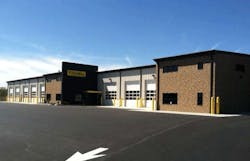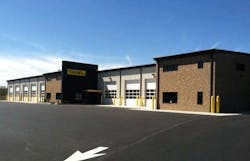Building a green shop
Managers: Gary Anderson and Harry T. Markarian
Titles: Executive vice president maintFleet: J.B. Hunt Transportation
Services Operation: Nationwide freight hauler operating a fleet of 10,000 tractors plus 60,000 trailers and containers
Problem: Sustainability strategy is by now a very familiar corporate catchphrase used in many U.S. industries, including the trucking business. But what does it actually mean? More importantly, how can sustainability be put into practice in the truck maintenance world?
The Environmental Protection Agency defines sustainability as “the ability to achieve continuing economic prosperity while protecting the natural systems of the planet and providing a high quality of life for its people.” Another definition favored by freight hauler J.B. Hunt is “the willing adaptation of an organization to the financial, environmental and social conditions necessary for the long-term survival and prosperity of that organization.”
Both definitions, notes Gary Anderson, J.B. Hunt’s executive vice presidentmaintenance, underscore the three-way balance among economics, environment, and society required for any human enterprise to survive and prosper indefinitely. Thus, finding more sustainable transportation methods is paramount for the “triple bottom line” of economic, environmental, and social success, Anderson argues. But figuring out a way to deploy that philosophy among Hunt’s nationwide network of maintenance shops proved a challenge.
Solution: In the end, notes Harry Markarian, regional director of maintenance-Northeast, solving this issue proved at once simple yet complex: Start at the very beginning and make new maintenance shops built by J.B. Hunt “green” from the foundation up.
The first example of the carrier’s green shop blueprint is opening this month in Harrisburg, PA: a facility comprised of 35,000 sq. ft. of shop space and 7,000 sq. ft. of office space. It houses six tractor bays, six trailer bays, a steam wash bay, and a drive-through gantry wash bay, while offering parking for over 240 tractors, 50 trailers and 68 personal vehicles for employees. Among the sustainable features used in the facility’s construction are the building materials themselves, says Markarian, and 75% of the total steel tonnage used to construct the building is recycled steel.
The facility’s 42,000-sq.-ft. white reflective roof has what’s known as a solar reflective index, or SRI, of 88, meaning that it reflects (rather than absorbs) significant amounts of heat, thus lessening the energy needed to cool the building. Markarian adds that a good portion of the old building got reused in the construction of the new one. Steel, copper and aluminum were all extracted during demolition and recycled, while 7,700 cu. yds. of rock and 3,200 cu. yds. of old asphalt were reused to build the new facility.
J.B. Hunt’s new Harrisburg shop is also equipped with light emitting diode (LED) fixtures versus fluorescent lamps. The LED lights last for 20,000 hours and consume far less energy, he notes.
Energy use is further reduced 50-80% through the use of light sensors in the shop and motion sensors in offices, bathrooms and break rooms in combination with skylights above the maintenance bays, storage areas, and break rooms. Finally, polished concrete floors throughout the facility not only helped to reduce construction waste but reduced the company’s impact on natural resources by eliminating the volatile organic compounds (VOCs) emitted when traditional floor paints are used.
“The green methods and materials utilized in the shop’s construction combine with the energy-efficient features used in its daily operation to reflect our commitment to sustainability,” Anderson says. —SEAN KILCARR

